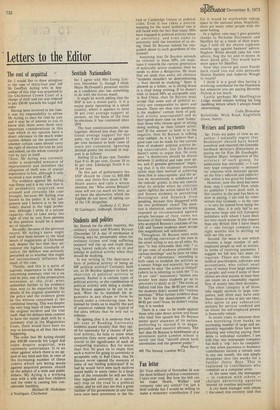The cost of acquittal
Sir: I would like to draw attention to the case of thirty-four year old Mr Geoffrey Ayling who in September of this year was acquitted at the Chichester Crown Court of a charge of theft and yet was ordered to pay £50.00 tpwards his Legal Aid costs.
Having been involved in the case, it was my responsibility to advise Mr Ayling to elect for trial by jury and it may be of interest to you to know that there were three very important considerations in this case which in my opinion have a direct relevance to the much wider current debate on the question of whether certain cases should carry the right of election for trial by jury and indeed, on the whole concept of trial by jury in itself. 7Xirst, Mr Ayling was currently under a suspended sentence of imprisonment and therefore the allegation of theft was of crucial importance to him, although it only involved a mat worth £7.00.
The evidence against Mr Ayling was flimsy and it is my view that in all probability suspicion was aroused and certainly the case brought, because Mr Ayling was known to the police. It is my judgement and I believe it to be one widely shared in the legal profession, although I write in a pricate capacity, that to take away the right of trial by jury from persons in this position would be a major act of injustice. Secondly, because of the previous record. Mr Ayling's name might well have been known to the local bench of magistrates at Chichester and, despite the fact that they administer the highest standards of justice, the defence was seriously perturbed as to whether this might not unconsciously influence the result of the case.
Thirdly, and this is a point of supreme importance in the debate concerning summary trial vis a vis trial by jury, one of the prosecution witnesses at the trial went somewhat further to his evidence than was to be expected by the details of his original statement to the police and the evidence given by the witness concerned at the committal hearing. This was despite the very long lapse of time between the original incident and the trial itself. Had the defence been content to have the matter dealt with by a summary trial in the Magistrates Court, there would have been no way or knowing at all that this was happening.
The order that Mr Ayling should pay £50.00 towards his Legal Aid costs despite acquittal, was extremely unfortunate. It is an other against which there is no appeal of any kind and this, in view of the increasing number of these orders which are being made against acquitted persons, should be the subject of a wide and public debate. My Ayling is a working man with a wife and four children and the order is causing him considerable hardship.
Michael H. Nicholass ,4 Northgate, Chichester










































 Previous page
Previous page